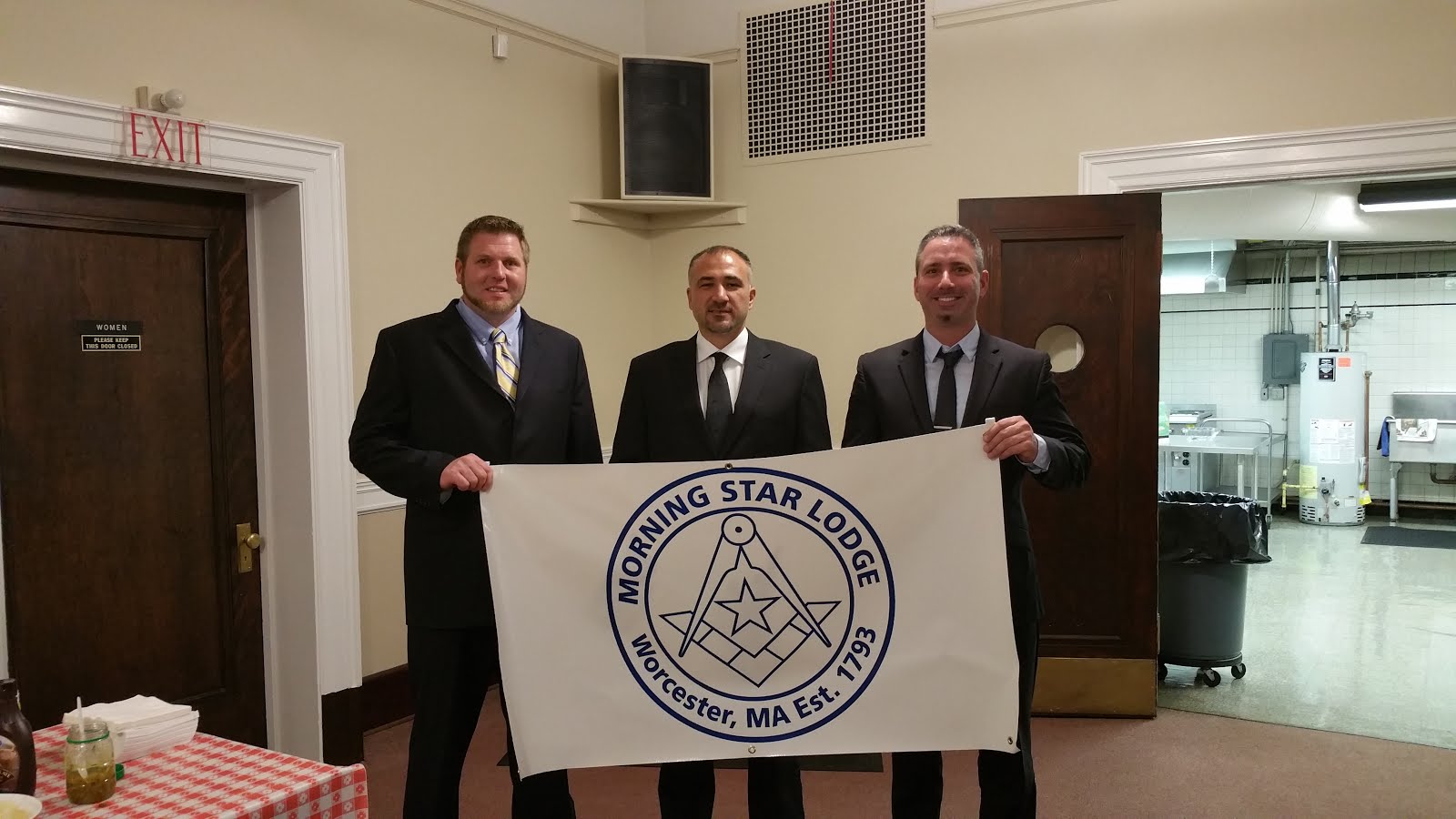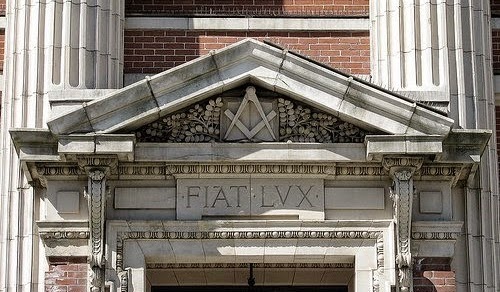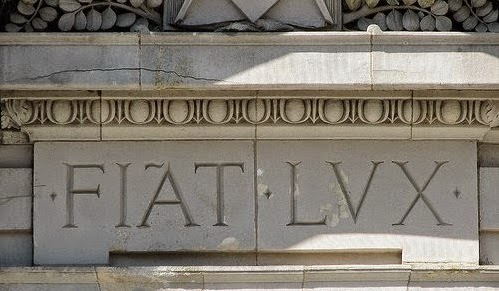A Brief History of Morning Star Lodge
This material is based on the work of Wor. Archie J. Horne for the 175th Anniversary of the Lodge with additions by R.W. Arnold R. Shaw for the past 25 years. Thus we have put together 200 years of (The) Morning Star Lodge (1793-1993).Serving a background for the history of the past 200 years of Morning Star Lodge, it would be well to point out that the growth of the Lodge has been a reflection of the growth of Worcester. Both Worcester and the Lodge prospered equally in good times and, unfortunately, suffered together in bad times. Records indicate that the population of this little crossroads town in 1790 was but 2,095 souls. In 1793, it might have increased by 100. In 1968, the population was about 183,000 and today it is in the area of 175,000 or perhaps less.
Even at that early time, the Town of Worcester had its reason for being. It was the crossroads for the stages and the settlers traveling westward; also for those moving from the south to the north. When the Blackstone canal to Providence came into operation in the 1820's, a marked growth appeared in the Town. This expansion was greatly accelerated by the advent of the Boston & Worcester Railroad in 1835.The effect of the Canal, and later at the Railroad, was to make Worcester, which had been a geographical center, the commercial and industrial center which merited the name of "The Heart of the Commonwealth." There followed a rapid expansion with many of the smaller operations of that date being expanded into larger industries, some of which are still in operation today. Worcester became an important industrial community and the commercial center of a vast trading area, and the expansion of these functions continue to some extent at the present time.
The City has always boasted of a skilled force of craftsmen capable of ingeniously producing difficult and complicated work to a high degree of perfection. These same workmen built their homes, raised their schools, their churches and their families in a generally prosperous community, and each contributed, according to his talents to the building of the community and its many social, cultural, and fraternal achievements.
Morning Star Lodge, like Worcester, also had its reason for being. First, there was a number of Masons in the community in the late 1700's, many of whom had membership either in the Boston Area or at Lancaster where the nearest Masonic Lodges were located. To visit his own Lodge, a man might require not less than two and sometimes four days to reach Boston and return, and at times two days to Lancaster.
There were other, and basically more important reasons. The aftermath of the revolution had left many local citizens in debt with their lands and goods seized, and many were sentenced to jail. There was no hard currency and credit was practically destroyed. The severe penalties inflicted upon the revolts of Captain Adam Wheeler and later Daniel Shay, both of which were ill-starred, but which temporarily closed the courts and required a large force of militia to restore order. It was some years before grievances of the soldiers and the citizens were remedied and business could again prosper. Hard work just to survive was the rule of the day. As a historian of that time write: "Brotherly love and charity envieth not, that seeketh not its own-Alas!, these were rarely found in the homes of our forefathers at that time". It was, therefore, evident to the members of the Craft in Worcester at that period that the ideals and philosophy of Masonry were badly needed in the growing Town.
Despite all the problems, a visitor in 1793 described the Town as one having large stores, many elegant houses, larger inns, not only for accommodation of County, at the times of holding of the courts, but also for travelers, a large and handsome schoolhouse, about 60 x 30 feet., and two Congregational Religious Societies. He goes on to say: "In this Town a number of gentlemen, requesting the same, received a Charter in April 1793 from the Massachusetts Grand Lodge for the holding of a lodge of Free Mason by the name of "The Morning Star Lodge." Isaiah Thomas was unanimously elected Master and on the 11th of June, the Grand Lodge of Massachusetts meeting in Worcester for the purpose, he was installed by the Most Worshipful Grand Master John Cutler, and the Lodge was consecrated". There were 13 petitioners for this Charter and, after the Lodge was consecrated, Isaiah Thomas served at its Worshipful Master for six years and later became Grand Master.
Apparently it was not unusual for a master to serve for several terms; Worshipful John Wilder was in office for four years (1811-1814), and Worshipful Horace A. Richardson served as Master for five years (1870-1875). Recent practice has been on or two years as the term for the Worshipful Master of the Lodge. It was a happy coincidence that credit and confidence were restored at about the same time in 1793 and the Town grew and prospered. Except for that dark period from 1828 to 1842, Morning Star Lodge increased in numbers and faithfully served the Craft. It had a rebirth in 1842 when a second Charter was granted by the Grand Lodge. The original Charter, which had never been surrendered, was taken from its hiding place, returned to the Grand Lodge and soon after it was present to Morning Star Lodge where it has been carefully preserved. As the Lodge grew it took step to move on to better and more suitable quarters.
It first met on the second floor of taverns on Main Street where food, drink, and lodgings, if necessary, were available. Over the years, meetings have been held in the following quarters: The Sun Tavern at the south corner of Main and Mechanic Streets The United States Arms which replaced the above The King's Arms at Elm and Main Streets The Healy House at 339 Main Street The Thomas Stevens Hall at the south corner of Main and Foster Streets The Masonic Hall at the rear of 339 Main Street The Thomas Stevens Hall at the south corner of Main and Foster Streets The Masonic Hall at the rear of 242 Main Street Heywood Hall at 357 Main Street The Waldo Hall at 357 Main Street All the above were in the central area of what is now downtown Worcester, and from their number it can be seen that out stay was not overly long in any one of the place. It was not until we shared quarters at the Masonic Hall at 21 Pearl Street, where we remained for 47 years, that we approached some permanence of our meeting rooms.
However, it was not until 1914 that Morning Star Lodge together with three other lodges in the City arrived at our present home in this beautiful building on Ionic Avenue. We are indebted to Worshipful Royal W. Cooper for his zeal in tracing these sites and reporting them in a brief but informative paper which he entitled "A Brief History of Morning Star Lodge." For some years this abbreviated history was given to candidates and it was from this work that members of this Lodge became better informed of their Lodge heritage. As mention above, in 1914 the existing four Lodges in Worcester moved into the new Temple making it the home for Morning Star and also Montacute, Athelstan, and Quinsigamond Lodges. Some years prior to 1914, a committee had been appointed to lay the ground work for the erection of a Masonic Temple in the City of Worcester. Their work was difficult and proceeded at a slow pace but they persevered. The group was eventually chartered as "The Worcester Masonic Charity and Educational Association." Members of the Morning Star Lodge were active in this working group. Worshipful Fred W. Leavitt, a Past Master of this Lodge, as President of the association, pushed the planning ahead with great persistence. Another of our Past Master, Right Worshipful Herbert P. Bagley, served as Chairman of the Building Committee and saw the task through to completion with the cornerstone being laid on September 12, 1913 and the building finished and dedicated on September 3, 1914 by the then Grand Master, Most Worshipful Melvin M. Johnson.
The monumental task of planning and completing so beautiful edifice, even as the clouds of war were on the horizon, provides not only excellent quarter, but stands as a memorial to those who worked so ardently to bring the plan of fruition. The 150th Anniversary of MORNING Star Lodge was observed during World War II. At that time the membership roster contain 848 names. Since that time the membership increased and then decreased to a great extent, being not much more than one of half that number at the present time. As was the case with our earlier brethren, there have been times of sunshine and shadow. There have been several economic depressions, we have weathered several wars and "Police Action" and have recently been going through the latest business recession. All of these have had an influence on the growth of Masonic Lodges. We are hopeful that the worse of the downturns are now behind us and that lodges may now look toward a brighter future.
At this point it would seem relevant to include notes on some unusual events that have occurred during the past fifty years. In the late afternoon of June 9, 1953, a tornado swept devastation and death across some nearby Towns and the northern section Worcester. Some 1200 homes were damaged, over 260 of which were demolished in Worcester alone and more than 90 people died as a result of a storm. A First Degree had been scheduled for that evening in Morning Star Lodge. The majority of the Lodge officers lived in the northerly area and were personally involved or were working hard on the rescue efforts. The Special Communication was opened by Right Worshipful Russell M. Blackmer for the purpose of initiating of two candidates, Stanley Benjamin Barber and Ollison Craig. The work of the evening was carried out by Right Worshipful Will Allen Gray in the East, Worshipful Royal M. Blackmer in the South. Brother, (now Worshipful) Henry E. Eklund served as Marshal and Brother Warren Barber, brother of one candidate, carried out the Senior Deacon's duties. Worshipful Brother Cooper delivered the lecture of the second section and Right Worshipful Brother Gray delivered the Master's lecture. Brother, later Worshipful Brother, Archie J. Horne moved to various positions as needed, Brother Joseph Smith was Organist and Worshipful Brother Joseph B. Shaw was Tyler. The Lodge had an unusual visitor that night as Worshipful and Reverend Rabbi Josephowitz of Worcester, South Africa attended. He added a friendly touch to an evening with gave proof of the ability of the Past Master of the Lodge to turn a difficult evening into a very successful one.
Another unusual event which should be included in this history of Morning Star Lodge concerns Rose of Sharon Lodge, the birth of which is covered in the 150th Anniversary History of Morning Star. Rose of Sharon Lodge was instituted on December 12, 1927, chartered on October 20, 1928 and returned its Charter to the Grand Lodge on June 15, 1974 when it was merged into Morning Star Lodge by Most Worshipful Donald Warren Vose, then Grand Master of the Grand Lodge of Massachusetts. Rose of Sharon Lodge was started, mainly by Past Master and members of Morning Star, in order to give men who worked at night during the week, a lodge they might join on Saturday night. The Lodge did fulfill that purpose for many years but changing customs in our society made Saturday night a family night out and removed the reason for the existence of the Lodge. Three officers of Morning Star Lodge served as Officers in Rose of Sharon. Worshipful Alden R. Tilander, Associate Chaplain, was presiding as Master when the lodges merged, Brother Albert Hayes, Inside Sentinel was a line officer and Right Worshipful Arnold R. Shaw, present Tyler, was serving as Tyler in both lodges at the time of the merger. A group, including some members of the original lodge, petitioned the Grand Lodge for a new daylight lodge under the Rose of Sharon name. This Lodge meets appropriately enough, on Saturday morning, the third Saturday of the month at the Masonic Home in Charlton.
Of the original happenings of Morning Star Lodge, we have records; of the recent we have personal knowledge; but of the great span between the old and the new, there is a dearth of information. We do know, however, that in the long middle period both officers and brethren completed their appointed tasks with fidelity, each building upon the Masonic Edifice to which he was introduced in his time. We know, too, that each new member was a rebirth of the Lodge and that he, in return would extend its teachings. The needs of our community, our country and the world, more than ever before, appear to call for the lessons of Masonry and the integrity of purpose and behavior which are imparted to its members. The forces against right and the just appear even more than those faced by our brother in 1793. We of this generation must demonstrate Masonry is alive and its teachings are vital in a world of turmoil and unrest. It is to those brethren who have passed on to the Celestial Lodge above and to those of the present who, by their noble and continuous endeavor have brought Morning Star Lodge to its present position that we truly give honor. To all those before us, we are indebted for the heritage which they created and kept alive for us in the Morning Star Lodge, and we silently pledge that what they taught us of Masonry we will cherish and pass on unimpaired to those who follow.





